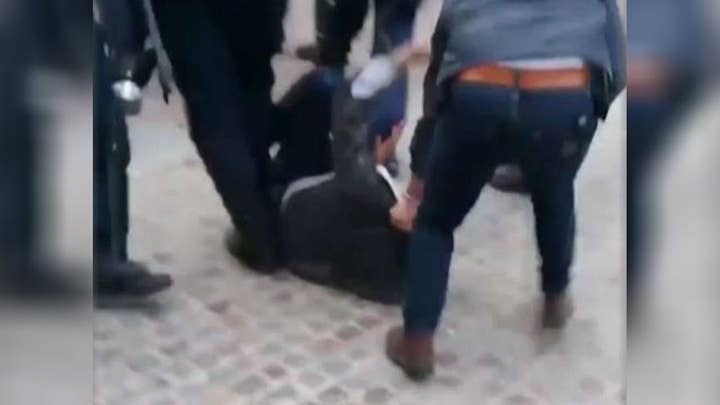French President Emmanuel Macron has presented himself as the international leader defending multilateralism and globalism against the rising forces of nationalism -- but at home he is facing a bleaker political outlook and plummeting poll numbers.
The dashing Frenchmen ran for the presidency in 2017 on a platform of pragmatic centrism, mixed with a dash of globalism amid a wave of nationalism sweeping through the continent. His comfortable victory over the nationalist Marine Le Pen was greeted with relief and joy by those concerned by the populist wave.
He was soon hailed as an unofficial leader of Europe, and even the world. As recently as April, Politico called him the “new leader of the free world.” Macron appeared to embrace that mantle as he came to the U.S. and made a fiery speech to Congress warning against nationalism and calling for an embrace of multilateralism and international cooperation.
“We will not let the rampaging work of extreme nationalism shake a world full of hopes for greater prosperity,” he told Congress.
Last month, he was at the United Nations General Assembly, castigating the same nationalist forces -- which was widely seen as a swipe at President Trump as he slammed a unilateralist approach that entails "a certain lawlessness where everyone pursues their own interests."
FRANCE'S MACRON SUGGESTS TRUMP CANNOT 'MAKE WAR' AGAINST EVERYBODY, EVERYTHING
“I will never stop upholding the principle of sovereignty even in the face of a certain nationalism, which we’re seeing today, brandishing sovereignty as a way of attacking others," he said just hours after Trump addressed the assembly.
But back home things look extremely shaky. His approval ratings have dived as low as 29 percent. Last month he was dealt a further blow when Gerard Collomb, the interior minister, resigned after having attacked Macron’s government for a “lack of humility."
Some of Macron’s unpopularity can be put down to his larger reputation as a narcissist obsessed with power and image. A number of politically awkward viral moments -- including him recently lecturing an out-of-work gardener to look harder for a job -- have hardened that image
“Less than 30 percent, according to the most recent polls, have a favorable opinion of him and half of the those who disapprove of him are very disapproving,” Ezra Suleiman, professor of politics at Princeton University, told Fox News. ”Those who have soured on him find him arrogant, didactic and not concerned with their problems.”
He has also faced difficulty in walking a fine line on immigration, trying to solve a continuing European migration crisis without alienating left-wing support for his broader agenda. France's parliament approved a bill in August that increases the time migrants can be detained, and also shortened application deadlines for asylum claims. It was opposed by some left-wing lawmakers, who decried it as inhumane while some on the right said it did not go far enough to deal with the migration crisis.
France’s left-wing has also been enraged by Macron’s tougher stance on labor unions, who he has sought to rein in as part of his efforts to boost the lagging French economy. He recently announced that the next budget will include a new tax cut, which Politico reported will be worth as much as €26 billion ($30 billion) for workers and employers, as part of an effort to boost those approval numbers and the economy.
“The left views him as too close to big business interests in France at the expense of ordinary French workers. On the right, he is a globalist politician who does little to defend France’s borders, French interests and is seen as as somebody who doesn’t understand concerns of the French people at a time of tremendous change and upheaval,” Nile Gardiner, director of the Heritage Foundation’s Margaret Thatcher Center for Freedom, told Fox News.
Gardiner also said that Macron’s projection of himself as the leader of the free world was “ludicrous” when contrasted with his own unpopularity at home.
“This is a president who cannot lead his own people let alone lead the globe. Macron is somebody who delivers big soaring speeches on the world stage without any foundation domestically. The reality is that France continues to be a country in decline and Macron is a symbol of that decline,” he said.
But Suleiman argued that Macron is widely perceived as a strong leader for France, and who has maintained a dialogue with President Trump. While Trump and Macron met in April in a meeting filled with hand-holding, smiles and general affection between the two, Macron has also blasted nationalism, criticized the U.S. departure from the 2015 Iran nuclear deal, and defended the Paris climate change agreement in his speech to Congress.
UNDER MACRON, FRANCE NUDGES OUT BRITAIN AS TRUMP'S FAVORED ALLY
“He remains a strong leader, a convinced European, and one who is prepared to lead against those members of the European Union who want to divide or attack the European project (the Hungarian, Austria, Italian, Polish leaders),” Suleiman said. “He is considered the leader against those who are working to undermine European Union.”
Macron has brushed off concerns about lagging poll numbers. In a recent interview with Bloomberg News, he noted that since he does not have midterm elections like in the U.S., he does not yet have to worry about poll numbers.
"I have a big advantage, I don’t have any midterms elections. So I am not driven by polls," Macron said. “I have to reform the country in depth. We will keep exactly the same pace.”






















